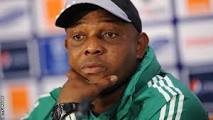
As player and coach, Stephen Okechuckwu Keshi (1962-2016), who died in the early hours of June 8, left formidable records.
He was the first and only Nigerian to win the African Nations Cup (AFCON) as a player (Tunisia, 1994), and coach (South Africa, 2013). In all of Africa, Keshi was only second to Egypt’s Mahmoud El-Gohary, in recording this feat.
He captained Nigeria’s first-ever national team to qualify for the World Cup, at USA ‘94. But that was after leading that team to win AFCON, for the first time on foreign soil, in Tunisia ‘94. That would be a second win, however, after the first home triumph, in Lagos, 1980.
So, out of Nigeria’s three AFCON wins, Keshi was involved in the last two, as player and coach, over a 19-year period! That shows his commanding influence on the Nigerian football of his generation.
Still, the 1994 double was at the dusk of his playing career. Nevertheless, the start of his career was no less glorious. When in 1979 he joined ACB, with Henry Nwosu, another kid wonder and mate at Finbarr’s, with whom he had won the Lagos State Principals’ Cup in 1978, he was a chubby but commanding 17-year old. At 22 in 1984, he had become one of the youngest to captain the national team. That team, of virtual rookies, under Coach Adegboye Onigbinde, won silver at the 1984 AFCON, losing the final to Cameroon.
But what seemed Keshi’s greatest benefit to Nigerian football — and the local economy — would come from putative disaster. The then Nigeria Football Association (NFA) had banned, for six months, Keshi and three of his New Nigerian Bank (NNB) FC teammates. The charge: tardiness to report to the Eagles camp, equating indiscipline. Keshi therefore signed for Stade Abidjan and later, African Sports, both of Cote d’Ivoire. His movement thereafter to Lokeren in Belgium, opened the floodgate for Nigerian professional footballers in Europe.
When Keshi settled at champions Anderlecht, Belgium had become a Mecca for starry-eyed Nigerian lads, whose lives would never be the same again. Enter, Nigerian armada of foreign-based professionals! Though that somewhat underdeveloped Nigerian local football, the players’ forex repatriation romped their individual families into new prosperity.
But Keshi’s mentoring was not limited to Nigerians alone. Nee Odartey Lamptey, former Ghana international and Keshi’s protégée at Anderlecht, broke down in tears on Brila Sports radio, 88.9 FM, recalling how Keshi “put food in my mouth”, by helping to midwife his professional career.
On the coaching front, Keshi set a record no African had attained: the first to qualify two countries for the World Cup: Togo (2006) and Nigeria (2014). Keshi’s feat at Togo was particularly striking, for unlike Nigeria, Togo belongs to those normally regarded as minnows in African football.
For Nigeria too, he was the first local coach to win a World Cup match: in Brazil 2014, with his 1:0 win over Bosnia and Herzegovina. All previous wins were under expatriate coaches.
Keshi had his own share of failures: his crash with the Nigeria Under – 20 side (2001 African Youth Championship); and his controversial exit, after failing to qualify Nigeria for the 2015 AFCON, even as defending champions, to give way for Sunday Oliseh, who proved a dismal failure.
But all taken, he lugged a sparkling career. Yet, both as player and coach, he never gelled with the Nigerian football aristocracy — why?
As team captain, he fought for his players’ right. For this, the players revered him. But the NFF resented him. As coach, he pulled a stunt, “resigning” immediately after winning AFCON in South Africa — a protest, many say, against how the football authorities neglected and abandoned the team until it achieved unexpected glory.
Keshi’s player/coach escapades, without prejudice to his own failings, would appear the same story: Nigerian football administration seriously lagging behind the footballers! Let the NFF therefore use Keshi’s death as painful reminder to up their game; and place Nigeria on its proper football pedestal.
Adieu, Big Boss has exited, one of Nigeria’s most iconic players in Nigerian football history.

No comments:
Post a Comment